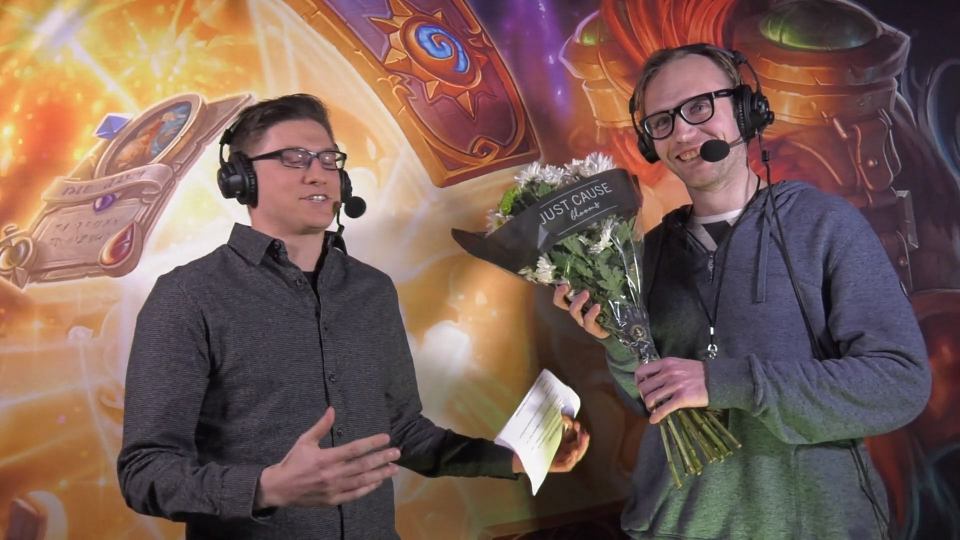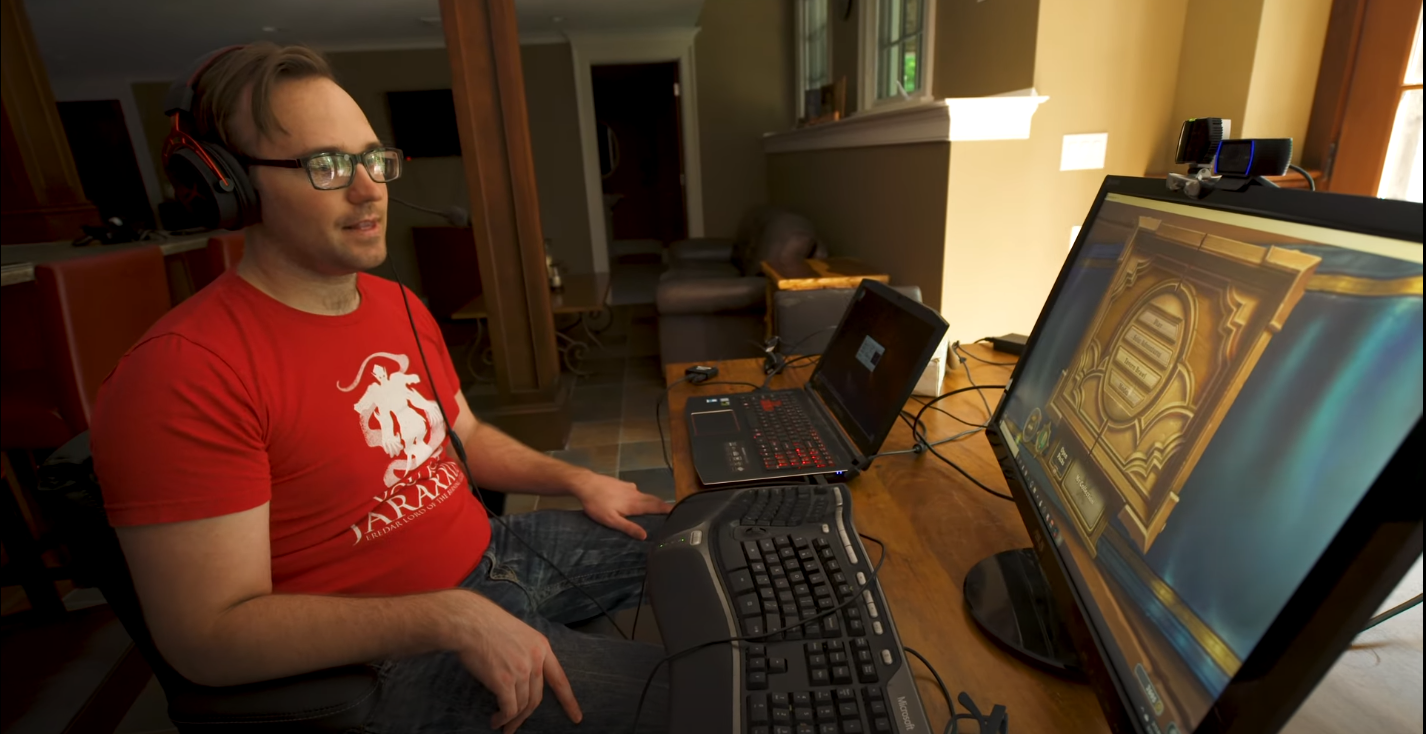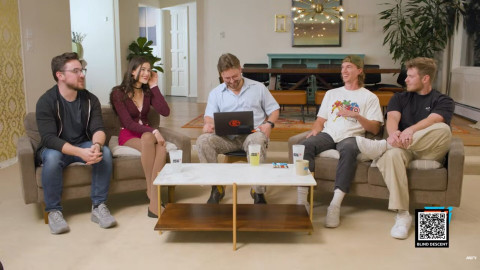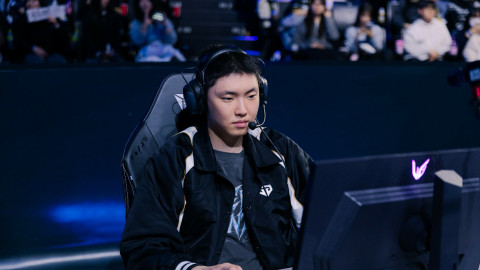
12 years ago, the world was Luke Kooken's oyster. He dabbled in standup comedy, played poker at a high-level and his passion at the time was dancing. Salsa, tango, swing, breakdancing, and jazz all occupied his free time when his college workload was not in the way.
However, as the cryptic saying goes: all good things must come to an end. And for Kooken, who now goes by "Nohandsgamer" online, his life (ironically) changed on the dance floor one day and he hasn't been the same since.
Fast forward to 2018 and Kooken is in Pennsylvania playing in the ACT Philadelphia Hearthstone tournament against some of the best players in the world. While the cash prize wasn't earth-shattering, it was his chance to showcase his thousands of hours put into Blizzard Entertainment's online card game and test himself against a field of long-time professionals in the game's competitive circuit.
For this event in particular, Kooken prepared not by his typical method of seeing what decks everyone else was playing and replicating them but by creating a lineup that countered what was popular (His four decks were Taunt Druid, Even Paladin, Kingsbane Rogue, and Cubelock). The results spoke for themselves and he won the event.
For the first time, Kooken felt like he could beat any one of the millions of active players of the game around the world.

One year later, working as a Data Analyst in the insurance industry, Kooken received the news that he was being laid off. While in between jobs, he capitalized on his free time by grinding and competing in Hearthstone. According to Kooken, his naturally obsessive nature allowed him to perform well on the game's in-game ladder and online tournaments that he participated in, he told Inven Global.
After a top 8 finish at Hearthstone's Master Tour event in Los Angeles back in March and a strong performance at Master Tour Jönköping in June, Kooken was preparing for the realistic news that he could be one of the few individuals selected to join the elite few referred to as Grandmasters — a conclave of professional players from around the world, who compete against one another in weekly online matches for a fixed salary, a chance at qualifying for the largest event of the year (the Hearthstone World Championship), and the accolades that come along with it.
On June 13, 2020, Kooken received the news and earned his spot.
Despite a long list of accomplishments in his life, Kooken views his recent promotion to Grandmasters as something he's particularly proud of.
"I have done a lot of things and I have gotten good at a lot of things but there is a difference between 'Oh, I'm good at things' versus 'I feel I'm exceptional,'" said Kooken. "I do feel right now in Hearthstone that I have the talent and the skillset with things like a statistical background and poker background [that translate] into Hearthstone and allow me to have a competitive advantage over other players for sure."

The day started no different than most for Kooken on the dance floor. He was working to become the best possible version of himself. What started with a jump and ended with a typical fall ended up leaving a life-altering outcome.
"I injured myself and then it just wasn't getting better. And it still hasn't gotten better. All of a sudden I couldn't dance or I would dance and I would be in pain and it would get progressively worse," said Kooken.
After visiting what seemed like countless doctors, the consultations began to feel routine: he would go, they would have their theory as to what was wrong with him, they would suggest a remedy (surgery, medicine, physical therapy) and the pain would either not go away or come back shortly after.
While recovering from surgery on his foot (for a nerve-related procedure), his hand began hurting as he laid in bed playing video games. Thinking nothing of it, he took a week off of gaming to give his hand a rest, but then the pain returned. In the decade since his hands have never not felt pain. Doctors ran similar tests on his hands, similar to his feet, and no real progress was made...just like his feet. Kooken opted out of receiving hand surgery as he knew the potential risk involved with such a sensitive area and the fact that the prior work done on his foot yielded no results.
His doctors' appointments, however, weren't useless in his eyes as a general theory was arrived at:
"I saw a few doctors who seem to think I may have a chronic regional pain syndrome where it is of the idea that your system starts going off and you become susceptible to these growing pains in different areas. It is common for people who experience this to get surgery and then afterward to experience the same pain down the road," said Kooken.
The pain wasn't just centralized in his feet and hands, it began popping up in what many would say are two of the most dangerous areas to experience discomfort: your back and your mind.
This led Kooken down a road of reflection, extreme frustration, and, to an extent, recovery.

In addition to the physical anguish that Kooken, now 31 and living in the Chicago area, was experiencing throughout his body, his mental health began to deteriorate as well: self-doubt, an uncertain future, and shame began to take over.
As the use of his hands and feet were limited, the prospect of facing the rest of his life as a disabled individual scared him. How could someone so athletic, active, and well-off now struggle to type on a keyboard for more than a few minutes before his hands stung with pain?
"I started to think: 'What the hell?' This has happened to me so many times where I have something I love, I start doing really well with it and then my pain comes and stops me," said Kooken. "I know for a long time I could not listen to swing music because it would be too painful," said Kooken.
After seeking assistance from a disability counselor at his college, a program was recommended to him that allowed him to type and use a computer with the sound of his voice. With the use of a now-discontinued headset, Kooken was able to work a normal 9 to 5 job despite limited use of his hands. His freedom, in a sense, was back. The use of an eye-tracking program, which he currently uses to play Hearthstone, has allowed him to return to gaming full-time.
While he was now able to complete the tasks that he missed doing, the pain persisted throughout his body. Kooken began reading books about back pain and learned about how much of a role a person's brain plays in physical discomfort. Between the advice of numerous doctors he has seen over the years and his independent reading of the world of psychology, Kooken finally thinks he knows what's wrong with him and has found a way of dealing with it to an extent.
"What the theory is, and I am not sure I understand it entirely, is that I have what is supposed to be a minor hand problem and my brain is making into a major hand problem," said Kooken.
By practicing certain psychological exercises, Kooken has been working to limit the amount of pain he feels on a daily basis in certain areas of the body. According to him, over the last few months, the pain in his hands has decreased by about 70 percent as a result. He cannot produce full-blown Hearthstone guides, but short bursts of typing are now manageable. It might not be what he was used to, but at least he's got through the dark period of time when he felt nothing but shame and frustration.
"I was waiting for life to start back up again. And I understand that life isn't supposed to be easy but I kept feeling that life was unfair and that I don't deserve this," said Kooken. "I had to tell myself at some point that no one is coming to save me, doctors aren't going to come and save me, society isn't going to come and save me so I have to figure this out on my own."
For many, asking for help isn't easy. It's being vulnerable to rejection. It's accepting that you physically, mentally, or emotionally cannot handle a certain task and need assistance. It's the perceived burdening of another individual. For someone who is disabled, asking for help isn't a one-off instance but a part of the routine.
"I think there was definitely a strong feeling of shame. I think what is really hard is having to ask for help a lot and you have to be willing to say 'I can't do this.'"
Tasks such as folding laundry, navigating Discord, and mundane day-to-day duties can be frustrating and limiting at times but where Kooken knows he is not at a disadvantage is on the battlefield playing Hearthstone and he is now one of 48 individuals in the world who can call themselves Grandmasters.
"I know I can beat anyone and they can beat me. It is a high RNG game but you coming with your strategy and you do the best you can and you hope the cards do on your brain is working that day and see what happens," said Kooken.
-

Tim Rizzo is the editor and a reporter for Inven Global. He joined the company back in 2017.
Sort by:
Comments :0





